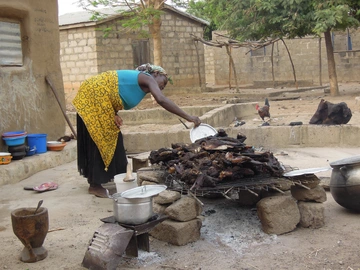Biomass production in Africa: possible gains and risks
April 24, 2014.
Concepts to increase food security while addressing growing demands for non-food biomass are still in their infant stages in Africa. So is the development of alternative biomass sources. Therefore, a project initiated by ZEF called BiomassWeb - Improving food security in Africa through increased system productivity of biomass-based value webs - aims at contributing to achieving food security in sub-Saharan Africa by focusing on biomass-based value webs.
Biomass-based value webs in sub-Saharan Africa
Biomass is defined as biological material from living or recently living organisms, which can be used for food, feed, sources of energy and industrial raw materials. The rapidly evolving and growing global demand and competition for biomass as agricultural output requires new concepts centering on biomass-based value webs. Various production, processing (incl. cascading reutilization of biomass), trade and consumption pathways can hardly be captured in a conventional value-chain approach.
The overarching goal of BiomassWeb is therefore to provide concepts for sub-Saharan Africa to increase food security through more and high-value biomass for both food and non-food purposes. An intensified food-biomass production, for example, increases the availability of food. Non-food biomass helps to generate income and, in this way, improves access to food. BiomassWeb intends to strengthen existing African expertise and add value to African agricultural efforts rather than to offer and transfer ready-made solutions to the African biomass-producing, processing and trading sector.
Biomass as a renewable resource is expected to play an increasingly important role in the future economies of most countries in sub-Saharan Africa. The expected trends of rising demand for more diverse biomass-based produce from agricultural land will transform the traditional agriculture from a food-supplying to a biomass-supplying sector. Biomass-based economies comprise farms as producers as well as all industrial and economic sectors and their associated services that produce, process, distribute and consume or use biological resources in one way or another.
Agriculture: Many roles and functions, also in future bio-economies
Agriculture is multifunctional. This is sometimes forgotten when thinking of the nearly one billion undernourished and over two billion malnourished people worldwide. The challenge of agricultural development is to allow people to live directly and indirectly from agriculture. It would enable them to produce enough food, to supply the markets with its produce as well as to earn a living from activities related to agriculture. A modern multifunctional agriculture should therefore not focus on food production alone, but on biomass production in general – besides all the environmental functions of agriculture not targeted in this project. Focusing on the production of food and non-food biomass from locally adapted crops can offer pathways to improve food security and to generate jobs. Income opportunities ensure access to food in rural areas, but even more in the biomass processing and trading sector. Agriculture has always fulfilled different functions and roles in human societies. Fulfilling these different roles will become even more important in an emerging bio-economy. Bio-economy refers to the sustainable use of biological resources such as plants, animals and microorganisms - including the processing of bio-materials and the value adding associated with it.
The potential of biomass in Africa
Many African countries have the potential to not only meet their own future demand for biomass-based produce but also to provide other African and industrial countries with raw materials and, most importantly, processed biomass products. But the actual available biomass is underutilized in sub-Saharan Africa. Despite this potential and according to a report of FAO published in 2013 on food insecurity, sub-Saharan Africa remains the region with the highest proportion of undernourished people related to the total population. To meet the food demand of Africa's fast growing population (from 1.02 billion people in 2010 to 1.56 in 2030 and 1.96 in 2050), and at the same time increase the income and supply of high-quality agricultural produce, Africa’s agricultural sector will have to swiftly increase both its production and its productivity. Increasing the efficiency must include recycling processes in order to close material cycles. These recycling processes may occur between production and consumption, but especially in the processing phase of the biomass utilization.
Scientific perspective
In this respect, the concept of biomass-based value webs is a useful scientific perspective to take when investigating agricultural activities in sub-Saharan Africa: (1) The development of multi-purpose crops allows producers to react flexibly to shifting demands, (2) the organizational features of value webs are inherently flexible and thus better suited to a volatile price environment when compared to the classical linear value chains, and (3) the web perspective better allows exploring synergies and identifying inefficiencies in an emerging agro-biomass sector, and thus could be critical to increasing the sector’s efficiency.
Authors:<link mail window for sending> Manfred Denich and <link mail window for sending>Detlef Virchow
You can also read the article in ZEF news no. 29 <link fileadmin webfiles downloads news zef_news_29_2014 zef_news_29_englisch_denich_virchow.pdf download file>here.



